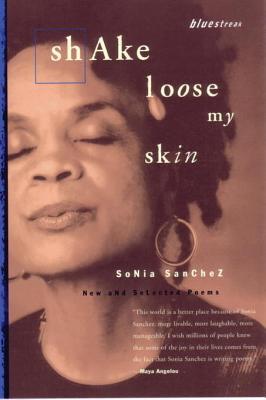
Shake Loose My Skin
New and Selected Poems
کتاب های مرتبط
- اطلاعات
- نقد و بررسی
- دیدگاه کاربران
نقد و بررسی

January 4, 1999
Mapping out an education that starts with a "Homecoming"--"I have been a/ way so long/ once after college/ I returned tourist/ style to watch all/ the niggers killing/ themselves"--and arrives at a "Love Poem" that asks, "where are the fathers/ strutting their furlined/ intellect bowing their/ faces in the crotch/ of academia," Sanchez avoids many of the poetic pitfalls that an explicit political agenda can entail. This gathering, including work from six previous collections, highlights Sanchez's range: prose poems investigate disenfranchised lives, from a lover strung out on dope to a hate-crime victim whose home has been spray-painted with the predictably horrifying epithets, while lyrics move down the page in sinewy lines that seem to pluck living speech from air. But it is love, or the lack therof, that is at the heart of the book. Sanchez's language is restless in seeking it out, shuttling back and forth from a gritty black vernacular in "Towhomitmayconcern" ("git yo/ self fattened up man/ you gon be doing battle with me/ ima gonna stake you out") to the jazzy nomenclature of "This Is not a Small Voice" ("This is the voice of La Tanya./ Kadesha. Shaniqua. This/ is the voice of Antoine./ Darryl. Shaquille.") Such polyvocal lyrics celebrate the breadth of black culture, and probe the silences of bigotry. Like June Jordan, Sanchez is at her best when enacting power struggles rather than merely rallying political support in easy battlecries, as some of these poems do. This collection should draw wide attention to the consistency of Sanchez's achievement, and to the success of her formal adaptations, like the recent "Blues Haikus": "am I yo philly/ outpost? man when you sail in/ to my house, you docked."

November 1, 1998
In this anthology, which include a tribute to her father, love poems, and notes to graduating seniors, African American poet and lecturer Sanchez brings together selections from her previous works (including the National Book Critics Circle nominee, Does Your House Have Lions?).

February 15, 1999
%% This is a multi-book review: SEE also the title "On the Bus with Rosa Parks." %% Ai's name is as terse as an element in the periodic table, and a symbol for a complex amalgam that is part African American, Japanese (Ai means love in that language), Choctaw, and Dutch, but this braided heritage rarely surfaces in her famously jolting poems. Ai prefers to write "fictions," dramatic, sometimes surreal monologues delivered by invented characters or headline icons. This form dominates her new work as well as the selections from her first four books, "Cruelty," "Killing Floor," "Sin," and "Fate." In the past, Ai has given voice to such figures as Jimmy Hoffa, J. Edgar Hoover, and Lenny Bruce. In her new poems, she scours today's news and writes about rapists, the paparazzi, Jon-Benet Ramsey, and a president embroiled in a sex scandal. Whatever one may think of Ai's poetics, her bold and searing performances constitute a key facet in the literature of cultural dissection.Dove is a far more lyric poet, and her poems are to be savored. She, too, is a storyteller, but for her the real action is on the inside, and her psychological portraits of mothers, fathers, and children are gently illuminating and arrestingly beautiful. In "Cameos," she traces the emotional fissures that run beneath the modest facade of a blue-collar family. The theme of self-betterment and a passion for learning runs through many poems, particularly those in a sequence titled "Freedom: A Bird's Eye View." Music animates Dove's supple lines as she praises Rosa Parks and all the unnamed heroines and heroes who calmly and firmly say no to what can and must be changed, and yes to what cannot.Sanchez, like Ai, has always been an outspoken and unflinching poet, innovative in her improvisations on meter and form. She moves from harmless-looking, short-lined stanzas that pack a wallop to jazzy prose-poems, giving shape and sound to every shade of mood, from blue to sensual, violent to celebratory. More than three decades of her work appear in this new retrospective volume, including concise early works from "I've Been a Woman" to prosy offerings from "Homegirls and Handgrenades," and on up through four subsequent volumes, ending finally with four new poems. ((Reviewed February 15, 1999))(Reprinted with permission of Booklist, copyright 1999, American Library Association.)

























دیدگاه کاربران